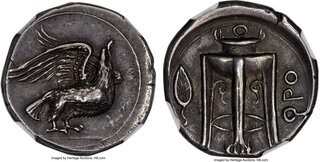| Heritage World Coin Auctions > CSNS Signature Sale 3115 | Auction date: 8 May 2024 |
| Lot number: 31001 Price realized: This lot is for sale in an upcoming auction - Bid on this lot  | Show similar lots on CoinArchives Find similar lots in upcoming auctions on |
| Lot description: Ancients BRUTTIUM. Croton. Ca. 425-350 BC. AR stater (22mm, 7.93 gm, 8h). NGC Choice XF★ 4/5 - 5/5, Fine Style. Eagle standing right, head raised, with wings displayed / ϘPO, tripod lebes with three handles, legs terminating in lion's feet; vertical bay leaf to left, all in shallow incuse circle. Gulbenkian I 128 (same obverse die). HN Italy 2148. SNG ANS 345. Stunning and artistic piece with a prestigious collection history. This coin features lovely charcoal cabinet toning and subtle luster that shines from within. Ex Long Valley River Collection (Roma Numismatics, Auction XX, 29 October 2020), lot 34; Heritage Auctions, Auction 3071 (7 January 2019), lot 34002; Johns Hopkins University Collection (Bank Leu-Numismatic Fine Arts, 16-18 October 1984), lot 112; John Work Garrett (1872-1942) Collection, privately purchased from Spink in June 1926; Frank Sherman Benson (1854-1907) Collection (Sotheby's, 3 February 1909), lot 112; Sir Edward Herbert Bunbury (1811-1895) Collection (Sotheby's, 15 June 1896), lot 204. Croton, an ancient Greek city situated in the southern part of the Italian peninsula in the region of Bruttium (now Calabria), boasts a rich and storied past dating back to around the 8th century BCE. Founded by Achaean Greek settlers, the city emerged as part of the broader wave of Greek colonization across the Mediterranean. Its foundation is steeped in legend, but as with most myths and stories of ole, there are multiple versions or explanations that often contradict one another. While Croton has multiple founding stories, they converge around a single founder, Myscellus, and his influences from the god Apollo and/or the mythic hero, Heracles. This divine connection not only lent Croton a sacred status but also deeply influenced its cultural and religious identity. After its establishment at the bottom of Italy's boot, Croton quickly flourished due to its advantageous geographical position, nestled on the coast of the Ionian Sea. This prime location facilitated trade, fishing, and agriculture, contributing to the city's rapid economic growth and prosperity. Moreover, the city gained a reputation for its remarkable achievements in athletics, philosophy, and medicine. This reputation attracted famous figures such as athlete Milo of Croton and the philosopher Pythagoras, who founded his renowned school there. According to ancient lore, the founder, Myscellus, was directed by the god Apollo, known for his oracular powers, to find and establish Croton. In Strabo (Geography, VI, 2), it is said that Myscellus traveled to the Delphi to consult with the oracle at the same time as a man named Archais. The oracle relayed to the two men that Apollo could give them either wealth or health. While Achais chose wealth and went on to found the wealthy colony Syracuse. Myscellus chose health and would land and prosper in the fertile land of Croton, a center for famous athletes and medicinal doctors. Also, this close connection to Apollo explains the inclusion of his emblematic tripod to hold a prominent placement of their earliest coinage. In ancient times, tripods were used as altars to sacrifice to the gods (including Apollo), and it was also the highest prize given to the victor of athletic games. https://coins.ha.com/itm/ancients/greek/ancients-bruttium-croton-ca-425-350-bc-ar-stater-22mm-793-gm-8h-ngc-choice-xfand-9733-4-5-5-5-fine-style/a/3115-31001.s?type=DA-DMC-CoinArchives-WorldCoins-3115-05082024 HID02906262019 © 2024 Heritage Auctions | All Rights Reserved Estimate: 10000-12000 USD |  |



